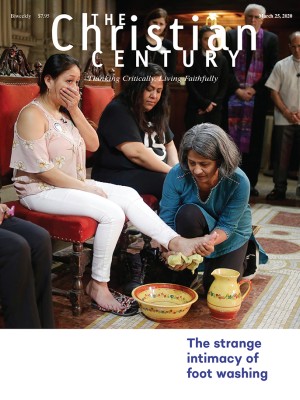April 5, Passion Sunday A (Matthew 26:14–27:66)
The story of Jesus’ unjust trial and wrongful conviction must not be romanticized.
Read the author's column on the Palm Sunday readings.
Trials make compelling entertainment. We revere To Kill a Mockingbird and 12 Angry Men. John Grisham’s and James Patterson’s names appear larger than their book titles. Law and Order ran 20 seasons and produced at least five spin-offs. There is something exhilarating about the control of violence, and something satisfying about its resolution. Nine times out of ten the bad guy gets his due and justice is served. Most well-heeled, white church members seem confident in our legal system, convinced that good generally overcomes evil.
The trial of Jesus might come as something of a shock.
Each Gospel writer tells the Passion of Christ in his own way. Matthew, more than the others, focuses on the trials. Twenty verses of this week’s assigned reading elapse in and around Pilate’s headquarters, the courthouse for Jesus’ second trial. According to Matthew, the first trial takes place before the Sanhedrin, presided over by the high priest. This first trial included false witnesses, torture, and a desire for a death sentence—a verdict a Jewish court could not deliver. With trumped-up charges and biased judges, draconian methods and an outrageous sentence, a modern church audience knows what to expect in Jesus’ appeal: Jesus should be exonerated, and all shall be well.
Read our latest issue or browse back issues.
An ancient church might have known otherwise. While we don’t know the identity of Matthew’s intended audience, scholars make educated guesses. Matthew’s heavy reliance on Jewish historical figures and frequent quotes from Hebrew scripture suggest Matthew writes to Christian descendants of a Jewish diaspora community living in or near Jerusalem—a community still under the thumb of Rome. Recent memories of Jerusalem’s destruction serve as a reminder: antagonizing Rome has its price, a price an infant Christian community can ill afford to pay.
So perhaps we can excuse Matthew for his gentle treatment of Pilate. The Roman governor presides over the second trial and seems to go out of his way to free Jesus. First Pilate gives Jesus an opportunity to respond to the charges against him, but Jesus gives no answer. Pilate then offers to release Jesus. He makes the choice easy for the assembled crowd: they can have the “Jesus who is called the Messiah” or Jesus Barabbas, a “notorious prisoner.” Matthew adds another incentive: Pilate knows Jesus is only on trial because of the religious authorities’ jealousy.
Uniquely in Matthew’s Gospel, Pilate’s wife—like Joseph and the Magi before her—even receives a warning in a dream. Matthew gives the impression that if he had his druthers, Pilate would free Jesus. But events take matters out of his hands. The crowd cries out for Jesus’ blood. Pilate washes his hands of Jesus’ guilt as the crowds conveniently claim it for themselves.
The idea that the crowd is Jewish and thus Jews are to blame for Jesus’ death has not been consigned to the dust of the Middle Ages or even to some bygone Nazi era. With increased attacks perpetrated against our Jewish neighbors, preachers must be explicit: anti-Semitism is antithetical to the gospel. The crowds are our spiritual forebears—their guilt is our own. We must admit the truth: we join the whole cast of characters who do nothing to stop injustice.
Jesus is flogged, mocked, and led away to Golgotha. There is no last-minute reprieve from Pilate or any other governor. Jesus will be crucified. The bystanders will find their entertainment. Soldiers gamble over Jesus’ clothing. The chief priests, scribes, and elders mock his predicament. Even those crucified by Jesus’ side join in the taunting. Others wait to offer him a sponge filled with wine, wondering whether Elijah will swoop in and save him.
But Jesus already knows the worst: God has forsaken him. God’s own son—even the centurion knows—dies.
This isn’t how we expect such a story to go. And yet, if we pay attention to history, if we listen to the voices of less privileged people, another truth becomes evident. The National Memorial for Peace and Justice memorializes 4,000 people lynched—often in daylight, in front of crowds, and at county courthouses. The Innocence Project has exonerated 367 people in its 19-year history, 21 of whom were on death row. The third season of Sarah Koenig’s Serial podcast recounts the shocking normalcy of the biased and flawed processes of a typical midwestern courthouse. The recent film Just Mercy, based on the book of the same name, tells the story of Walter McMillan, an innocent man nearly sent to death, and the lawyer, Bryan Stevenson, who fought for his release.
Last January Bryan Alexander interviewed Stevenson for USA Today. When Stevenson first began representing wrongly convicted men in Mississippi, people would tell him he ought to visit the To Kill a Mockingbird museum. Stevenson told Alexander, “I had the same response every time: ‘I’d love to, but I’m really busy freeing an innocent black man who has been wrongly convicted of a crime and facing execution’ . . . the disconnect between romanticizing that story and indifference to injustice in a real wrongful conviction, that very much parallels my story.”
The story of Jesus’ unjust trial and wrongful conviction must not be romanticized. In Matthew’s narrative we see not an anomaly, but the way the legal system often operates. Passion Sunday offers us an opportunity to leave behind our comfortable fictions, give up easy entertainment, and own our own role in perpetuating injustice. We are the guilty in this courtroom drama. But the blood on our hands, Jesus’ blood, through the grace and power of God, will become the means to our salvation. We can dare to abandon our comforting fictions knowing that God’s justice is greater, God’s mercy truer, than our own.





